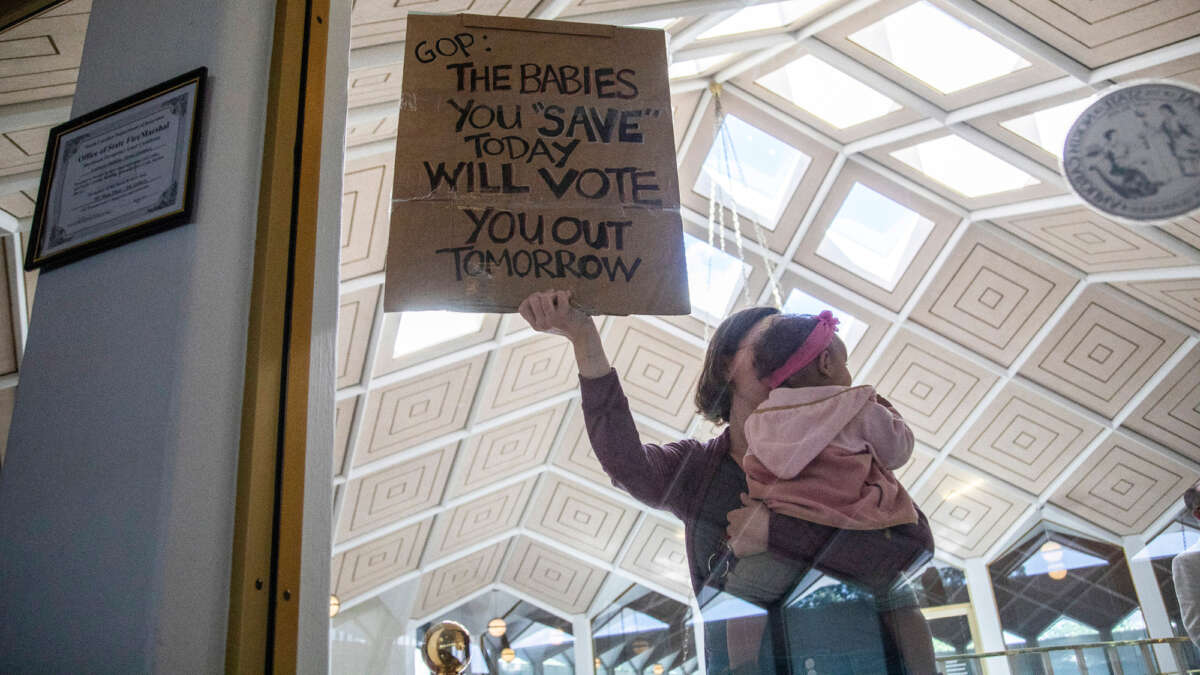North Carolina’s Republican-led legislature overrode Gov. Roy Cooper’s veto of a 12-week abortion ban. It will take effect July 1.
The ban will further erode access to abortion in one of the last Southern states to permit the procedure past six weeks. Until now, abortion was legal up to 20 weeks in North Carolina, making it a haven as surrounding states passed near-total or very limited abortion bans. In the first six months since Roe v. Wade was overturned last summer, abortion providers in North Carolina performed an average of 788 more procedures per month — one of the most significant increases in the entire country.
The state Senate voted relatively quickly, wrapping debate in about an hour. But in the House — where Republicans only recently gained a majority after Tricia Cotham switched from the Democratic to the Republican Party — the discussion over whether to override Cooper’s veto was lengthy and emotional. Several Democrats appeared near tears. One, Rep. Diamond Staton-Williams, shared her own story of getting an abortion in 2002, when she and her husband already had two children and she was a student.
“It wasn’t an easy decision at all. It wasn’t made frivolously or lightly,” Staton-Williams said. “I knew that in order for my family to prosper and to continue with the opportunities we had in front of us, this was the best decision for us.”
The final vote in the House was 72-48.
Though most abortions take place before 12 weeks of pregnancy, providers in North Carolina have said the legislation’s other restrictions will make the new limit far more onerous. The new law prohibits the mailing of medication abortion and requires patients to make at least two in-person visits separated by 72 hours to get an abortion. Additionally, the law prohibits abortions performed “in whole or in part” because of a fetal diagnosis of Down syndrome and imposes new licensing restrictions on clinics.
The North Carolina law is less restrictive than other bans approved in the South this year, such as a six-week ban passed in Florida. (The law hasn’t yet taken effect, thanks to a pending case at the state Supreme Court regarding whether the Florida constitution protects the right to an abortion.) But it is likely to have an outsized impact. The limits on medication abortion — which clinics have relied on as they’ve seen an influx of out-of-state patients — and in-person visitation requirements could make it harder for people traveling from elsewhere to get a timely appointment in North Carolina, which is home to 13 abortion clinics.
Outside of North Carolina, people in states further south — Georgia, Florida, Mississippi, Alabama and Louisiana — would have to go to one of the three abortion clinics in South Carolina, none of which provide abortions past 14 weeks, or travel to Virginia, Washington, D.C., or Illinois. South Carolina has also already seen an increase in out-of-state patients, per state health data.
The travel burden could be intensified if South Carolina lawmakers agree to pass a six-week ban, as they are currently debating. A six-week ban in that state and a 12-week ban in North Carolina together would effectively end abortion access for most Americans living in the south.
Medical providers in North Carolina, meanwhile, have warned that the new law’s restrictions could drive them to leave the state. During the sole public hearing the bill received, several doctors and medical residents testified in opposition to the abortion ban, with some saying it had made them reconsider their decision to practice in North Carolina. More than 1,500 health professionals in the state signed an open letter criticizing any abortion ban more restrictive than 20 weeks. Already, other states with strict abortion bans have seen doctors choose to leave, and fewer aspiring medical residents have applied to programs in those states.
Several have also criticized the law’s medical exceptions. Though in theory they allow for an abortion at any point in pregnancy to save the pregnant person’s life or up to 24 weeks for a fatal fetal anomaly, the language of those exceptions is unclear, many doctors said.
“It’s unclear in this legislation who is sick enough for us to care for,” said Dr. Beverly Gray, associate professor in the Duke University Department of Obstetrics and Gynecology. “That makes it very challenging for us to do our jobs effectively.”
Media that fights fascism
Truthout is funded almost entirely by readers — that’s why we can speak truth to power and cut against the mainstream narrative. But independent journalists at Truthout face mounting political repression under Trump.
We rely on your support to survive McCarthyist censorship. Please make a tax-deductible one-time or monthly donation.
